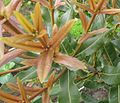Macadamia
An overview of macadamia nuts, their cultivation, nutritional value, and uses.
Macadamia[edit]
Macadamia is a genus of four species of trees indigenous to Australia, and constituting part of the plant family Proteaceae. They are native to northeastern New South Wales and central and southeastern Queensland. The trees are cultivated for their fruit, the macadamia nut, which is a popular food.
History[edit]
The macadamia tree was first described in 1857 by the German-Australian botanist Ferdinand von Mueller. The genus was named in honor of the Scottish-Australian chemist John Macadam. The commercial production of macadamia nuts began in the late 19th century, and they are now grown in several countries, including Hawaii, South Africa, and Brazil.
Cultivation[edit]

Macadamia trees thrive in well-drained soils with a pH of 5.0 to 6.5. They require a frost-free climate with moderate rainfall. The trees are typically propagated by grafting to ensure the quality and consistency of the nuts. It takes approximately 7 to 10 years for a macadamia tree to begin producing nuts.
Nutritional Value[edit]
Macadamia nuts are known for their high-fat content, which is predominantly monounsaturated fat. They are also a good source of dietary fiber, protein, thiamine, and manganese. The nuts are low in carbohydrates and contain no cholesterol, making them a heart-healthy snack option.
Uses[edit]
Macadamia nuts are consumed raw or roasted and are often used in baking and cooking. They are a popular ingredient in cookies, cakes, and confectionery. The oil extracted from macadamia nuts is used in cooking and cosmetics due to its stability and moisturizing properties.
Health Benefits[edit]
Consuming macadamia nuts may offer several health benefits, including improved heart health, weight management, and enhanced metabolic function. The high content of monounsaturated fats can help reduce LDL cholesterol levels, while the fiber content aids in digestion.
Gallery[edit]
-
Macadamia
-
Macadamia
-
Macadamia
-
Macadamia
-
Macadamia
-
Macadamia
-
Macadamia
-
Macadamia
-
Macadamia
-
Macadamia
-
Macadamia
-
Macadamia
Related pages[edit]
Ad. Transform your life with W8MD's Budget GLP-1 injections from $49.99


W8MD offers a medical weight loss program to lose weight in Philadelphia. Our physician-supervised medical weight loss provides:
- Weight loss injections in NYC (generic and brand names):
- Zepbound / Mounjaro, Wegovy / Ozempic, Saxenda
- Most insurances accepted or discounted self-pay rates. We will obtain insurance prior authorizations if needed.
- Generic GLP1 weight loss injections from $49.99 for the starting dose of Semaglutide and $65.00 for Tirzepatide.
- Also offer prescription weight loss medications including Phentermine, Qsymia, Diethylpropion, Contrave etc.
NYC weight loss doctor appointmentsNYC weight loss doctor appointments
Start your NYC weight loss journey today at our NYC medical weight loss and Philadelphia medical weight loss clinics.
- Call 718-946-5500 to lose weight in NYC or for medical weight loss in Philadelphia 215-676-2334.
- Tags:NYC medical weight loss, Philadelphia lose weight Zepbound NYC, Budget GLP1 weight loss injections, Wegovy Philadelphia, Wegovy NYC, Philadelphia medical weight loss, Brookly weight loss and Wegovy NYC
|
WikiMD's Wellness Encyclopedia |
| Let Food Be Thy Medicine Medicine Thy Food - Hippocrates |
Medical Disclaimer: WikiMD is not a substitute for professional medical advice. The information on WikiMD is provided as an information resource only, may be incorrect, outdated or misleading, and is not to be used or relied on for any diagnostic or treatment purposes. Please consult your health care provider before making any healthcare decisions or for guidance about a specific medical condition. WikiMD expressly disclaims responsibility, and shall have no liability, for any damages, loss, injury, or liability whatsoever suffered as a result of your reliance on the information contained in this site. By visiting this site you agree to the foregoing terms and conditions, which may from time to time be changed or supplemented by WikiMD. If you do not agree to the foregoing terms and conditions, you should not enter or use this site. See full disclaimer.
Credits:Most images are courtesy of Wikimedia commons, and templates, categories Wikipedia, licensed under CC BY SA or similar.
Translate this page: - East Asian
中文,
日本,
한국어,
South Asian
हिन्दी,
தமிழ்,
తెలుగు,
Urdu,
ಕನ್ನಡ,
Southeast Asian
Indonesian,
Vietnamese,
Thai,
မြန်မာဘာသာ,
বাংলা
European
español,
Deutsch,
français,
Greek,
português do Brasil,
polski,
română,
русский,
Nederlands,
norsk,
svenska,
suomi,
Italian
Middle Eastern & African
عربى,
Turkish,
Persian,
Hebrew,
Afrikaans,
isiZulu,
Kiswahili,
Other
Bulgarian,
Hungarian,
Czech,
Swedish,
മലയാളം,
मराठी,
ਪੰਜਾਬੀ,
ગુજરાતી,
Portuguese,
Ukrainian











